- Home
- Richard Adams
The Plague Dogs: A Novel Page 18
The Plague Dogs: A Novel Read online
Page 18
“I’m sorry. I’ll have to get some feathers for my head, won’t I? It’s ringing like a white bell-car; no wonder it feels noisy.” Confused, he hopped a few yards on three legs, peed against a stunted rowan and came back. The tod lay watching him with an air of detached appraisal.
“Hoo ye goin’ on? Ye heven’t tuk bad?” Before Snitter could reply it added, “Ah’ll caall up th’ big feller noo. We’ll hev te be goin’.”
“Already?”
“Ay, time w’ wor away hyem.”
“Which way?”
“Up ower th’ top of th’ clough there.”
“I hope I can do it.”
“Ye’ll hev te tek it canny, lad. Yer far ower tired fer runnin’ aboot, so th’ sharper we’re off, th’ forther we can get afore th’ leet comes.”
The rain had ceased. Rowf, still half-asleep, dragged the sheep’s fore-leg out of the sticky welter and carried it as they set off, climbing steeply up the bed of the gill and so out on to Harter Fell’s north shoulder. It was here that Snitter began to fall behind and finally lay down. The others came back to him.
“It’s too much for me,” gasped Snitter. “I’ll have to follow you home later. I feel so strange, Rowf. My feet are cold.”
Rowf put down the fore-leg and sniffed him over. “You’re all right—it’s only in your head, you know.”
“I know that—it’s looking out of it that’s so difficult. I’m not at all sure it’s me inside, either.” Snitter kicked gingerly, testing one back leg. “Is it—is it—glass or what?” He stood up and immediately fell down again. “My leg’s over on the other side of—of the—”
Rowf sniffed again. “Your leg’s all right—”
“I know it is, but it’s over there.”
“That’s the sheep’s leg, you fool.”
“That’s not what I mean,” said Snitter miserably. “I can’t—what is it? Talk- to my leg.”
“Let’s away, an’ give ower yammerin’! If wor still on th’ fell when th’ sun’s up, wor knacked. Them farmers—if they clap their eyes on us—”
Harter Fell
“Oh, do leave me and get on!” cried Snitter desperately. “Let me alone! I’ll be back before mid-day. No one’s going to see me—”
“See ye a haff-mile off in a mist, hinny—ye an’ yer magpie’s jacket—”
Enveloped in the mist pouring from his own head, clung to by impalpable flies, enclosed within a jolting, invisible helmet of chicken-wire, Snitter floated away, watching the tod’s mask recede and fade upstream through brown peat-water flowing insensibly, yet plain to be seen, across his flank.
When he awoke, the sun, from a clear sky, was shining warm into his head. A ladybird was clambering laboriously among the bents close against his muzzle, and he watched it without moving. Suddenly, beyond and between the grass stalks, a buzzard sailed into sight, low against the blue, and hung, wings fluttering. Snitter leapt up and the buzzard slid away.
He looked about him. The slope was empty. The others had gone. At least—He ran a few yards uphill, until he could look round the base of a nearby crag and, in the same moment that he knew himself to be alone, realised also that his faculties had returned and that he could both see clearly and use his legs. His head was still ringing, but at least he could now lift and carry it.
He must be off. The voice of the Bootterilket sheep’s blood was crying from the ground not half a mile off. He thought of the long run back to Brown Haw and of the farms to be avoided on the way. It would be tricky going in the broad, morning daylight. Should he perhaps wait until nightfall? But then, where could he lie up? Not here. He remembered the tod’s warning. This was too close to the scene of the kill. Elsewhere, then; and if he had to look for a refuge, he might as well seek it along the way home as anywhere else.
Which way might the tod have guided Rowf? Not the way they had come, that was as good as certain. Snitter, muttering “Roondaboot, roondaboot,” cast back to where he had been lying and without difficulty picked up the tod’s scent in the heather. To his surprise it led down the fell well to the north of their last night’s route across the Duddon. Scattering innumerable spiders and a drowsy bumblebee or two, he shushed his way downward through the wet bracken and all in a moment found himself out upon the Hard Knott pass road where it wound back and forth in steep hairpin bends up the hillside. He nosed quickly across the narrow, grey roughness of tar and petrol exhaust and picked up the tod’s line again on the opposite side. Down once more and so, at length, round towards Duddon and the Cockley Beck farmhouse standing among its trees on the further side of the bridge.
As he splashed his way across the river some little distance above the bridge and climbed back up the bank to the road, he was suddenly aware of a car standing on the verge near the signpost, about fifty yards away. Against it a man was leaning—a man with very clean boots, new, heather-coloured knee-breeches, a green twill coat and round, brimmed hat to match. Even at this distance the smell of his clean clothes was plain. His face was turned towards Snitter, but his eyes were obscured by some object which he was holding in front of them—something resembling two small bottles—two dark, glassy circles, fastened together. Beside him, propped against the wing of the car, stood a double-barrelled shot-gun.
The dog hunt, just as Mr. Ephraim had envisaged, had begun in good time and fine weather on Saturday morning, the various farmers assembling at the Traveller’s Rest at Ulpha and being fortified with coffee and sandwiches by the landlord, Mr. Jenner, before proceeding up the valley to make a start on Caw and the rest of the Hall Dunnerdale land. Dennis, who had been infuriated by the frustration of his telephone conversation with Mr. Powell and more than ever convinced that Animal Research were at the back of all the trouble, had told everyone to look out for a dog wearing a green plastic collar.
Mr. Ephraim himself, resplendent in new boots, sporting jacket (to use his own term) and pork-pie hat, and carrying for the occasion a borrowed twelve-bore of which his pride considerably exceeded his experience, was eloquent on the sartorial rewards to be distributed to the participants, but distinctly less knowledgeable about the way in which the hunt might best be organized. However, being a good-natured gentleman and anxious above all to stand well with customers and potential customers, he was perfectly agreeable to this part of the business being arranged by others, and watched appreciatively through his binoculars as the guns, spaced about sixty yards apart, combed the breadth of the hillside southward from Caw, reassembled, swung round westward to Brock Barrow and finally regained the valley road by Low Hall. Dennis had bagged a grouse and old Routledge, a noted wag, had first missed a snipe and then accounted for a slow-flying magpie as it cocked its tail on a branch. Otherwise they had seen nothing but sheep, meadow pipits, crows and buzzards.
Mr. Ephraim and Mr. Furse (the latter taking copious notes and accompanied by a lady photographer) received them on the road with encouragement and nips of whisky, and they were further stimulated by a fine turn-out on the part of the various ladies of the valley—Gwen Williamson and her girls, Mary Longmire from the Newfield Hotel, Sarah Lindsay, Dorothea Craven (“Oh, what fun!”), Joan Hoggarth, Phyllis and Vera Dawson who kept the shop by the bridge, and several more. There was some disappointment that no one should as yet have seen the least sign of the dog marauder, but Mr. Ephraim, undeterred, made light of it.
“Well, it’s early yet, ain’t it? Anyway, at least we’ve found out where the dog’s not, and no more dead sheep on your land either, Mr. Lindsay, eh? What you think we’d better do now, Mr. Longmire? Go up the valley and work over Mr. Williamson’s land?”
“Ay, that’ll do,” answered Jack; then, turning to Harry Braithwaite, he added, “D’ye think so, ‘Arry?”
Since Mr. Ephraim found Mr. Braithwaite (whose Lancashire was extremely broad) altogether incomprehensible without interpretation, he contented himself with beaming on everyone, shepherding them into the hired minibus and leading the way up the valley in his car, leaving th
e ladies to go home to late breakfasts.
The first leg of the hunt had also been observed with close interest by the tod and Rowf, from the concealment of a pile of tumbled boulders near the summit of Caw itself. It was only with difficulty that Rowf had been persuaded to leave Snitter asleep on Hard Knott, and he had at last agreed only when the tod had threatened to leave them both altogether.
“Who’s te knaw what’s gone wrang wiv him? We canna bide wiv’m till he wakes. If we divven’t shift oursels, we’ll aall be finished—him an’ aall. He can folly us back when he’s pulled hissel’ tegither. Yon’s ne fyeul, on th’ fell or off’t. Poor sowl, it’s yon dent in his head.”
They had already waited so long on Hard Knott, however—indeed, until the first streaks of dawn began to show behind the distant Wreynus Pass to the east—that the tod insisted that they must now make their way back by the highest and loneliest ground. They crossed the Duddon well above Cockley Beck, ran up Dry Gill in the first light and so on to Fairfield and the back of the Grey Friar. From here they made a straight five miles southward, passing over Goat’s Hause, down the east side of Goat’s Water and so, at length, along the eastern flank of Caw. The sun was gaining authority every minute and now, with less than a mile to go to their shaft, they lay down to rest in a patch of shade under a thorn-bush. As they did so the light wind veered round into the west and immediately the tod tensed and crouched flat.
“What’s the matter?” asked Rowf, copying him quickly.
“Haald yer gob! Them lot o’ th’ fell, kidder! If ye got ne nose, ye got lugs, ha’ ye not?”
It slunk quickly uphill for two hundred yards, Rowf following, and then inched its way forward between the rocks. They could now see plainly the line of farmers, backs toward them as they combed the fell below. There was the sound of a shot and Rowf ducked lower still.
“D’you think they’re looking for us?”
“Who else? Ne doot at aall. Sneaky sods, craalin’ aboot roond our place. They should think shame! By, what wid Ah do if Ah’d th’ power mesel’? Ah’d skite thim!”
“They’re moving off out of it now, though. Shall we go back?”
“Go back? Nay, not for two morns. Mebbies more. Are ye daft?”
“Where then?”
“A quiet spot, and a lang way backa beyont, Ah warr’nd.”
“Not without Snitter,” said Rowf emphatically. He waited for the tod to reply. After some moments it turned its head and stared at him without a word. Rowf, disturbed and excited as always by the rank, vulpine smell, stared back, watching the sun and moving shadows reveal and again cloud the irises of its eyes, flecked and peat-brown as the floors of shallow pools in the moss. At last he got to his feet.
“If as many men as that are hunting the valley for us, then Snitter’s in great danger. I’m going back for him.”
“Ye goin’ on yer aan, hinny.”
Harry Braithwaite, Jack Longmire and the rest had finally decided that probably the best course would be to tackle next the mile-long north-west slope of the Grey Friar, from Fairfield and Hell Gill Pike down towards Cockley Beck and Wreynus Bottom. This stretch—by the time they had got up there and down again—would occupy the rest of the morning until lunch time. (Lunch, with beer, was, of course, being provided by Suitable Suits and they were looking forward to it.) Then in the afternoon (“If we’ve noan shot th’ sod bi then,” as Dennis remarked) they could conclude by getting up on Levers Hause and combing out the Tongue ‘Us land on either side of Seathwaite Tarn. Mr. Furse, still indefatigably taking notes, boarded the minibus and set off with the rest for the top of Wreynus and the ascent of Wetside Edge, while Mr. Ephraim—who had no taste for climbing—disposing his binoculars and gun at the ready, remained alone at Cockley Beck.
“If you drive it down towards me, gentlemen, I shall know what to do, shan’t I? You might find it hung up to dry, eh, by the time you get down for lunch?”
“Wi’owt he’s ett it ‘isself,” remarked old Routledge, to a general laugh as the minibus moved off again.
Mr. Ephraim sat on the parapet of the bridge in the cool November sunshine. Below him the brown Duddon chattered between its rocks. A late grey wagtail, dark-backed and clear yellow beneath, bobbed and flirted its way upstream from stone to stone and a robin twittered autumnally in a half-bare mountain ash. With a thrusting heave of its buttocks, a black-faced Herdwick scrambled up from a peat-rift and trotted away through the ling, while far beyond, the cloud shadows followed one another in ripples across the great slope of Stonesty Pike. On the Cockley Beck clothes-line, two or three brightly coloured dishcloths were cracking like whips in the wind.
Mr. Ephraim noticed little and felt less of the lonely scene around him. As much as he could, he avoided being alone, for all too often the memories induced by solitude would speak with the voices of hell. He thought of his father and mother, gone without strength before the pursuer; then of his Aunt Leah, vanished more than thirty years ago into the night and fog of desolate Europe, slain by God alone knew what sword in the wilderness. His elder brother Mordecai, weeping with shame, had given evidence, for the sake of truth and justice, in the libel action brought in London during the sixties by the infamous Dr. Dering, the self-styled experimental research expert of Auschwitz. Yes, it was indeed more than thirty years, thought Mr. Ephraim, since the whirlwind had passed and violence had covered the mouth of the wicked; yet still the pestilence walked in the dark places of recollection; and no doubt for him it would always do so. He forced his thoughts towards better memories; of the Danube, rolling broad and smooth through Austria; of its cities and vineyards. When the evil began he had been only a little child. His mind, like a frightened dog, crept miserably back to the place whence he had tried to expel it. He recalled, one after another, the years during which he had grown up and had journeyed at last to this cold, northern land of idle, half-hostile gentiles who concealed their hearts and never spoke their thoughts—or not, at all events, to strangers. And here he was, breaking the sabbath among peasants in a cold wind, for the sake of recovering, insofar as anyone could, some part of that substance and standing which his family had once known, before their dispossession and—and murder.
“It’s a bad world for the helpless,” said Mr. Ephraim aloud.
He stood up, stamped his feet on the hollow bridge and strode back to the car. This wouldn’t do. He must, as so often before, snap out of it. There was as yet no sign of the farmers descending the fell. However, there was no harm in being prepared for the chance of action. Some of the men had thought it more than likely that the dog, if it were on the fell at all, would take alarm quickly, slink away well ahead of the gun line and come down into the bottom. Mr. Ephraim took his own gun out of the car, loaded and cocked it, put on the safety catch and propped it against the wing. Then he fell to scanning the hillside through his binoculars, first the Grey Friar, then the Crinkle Crags and finally Hard Knott to the west.
Suddenly he tensed, swung the glasses a second time towards the foot of Hard Knott Pass, adjusted them to give a clearer foreground focus and then remained gazing intently. A smooth-haired, black-and-white dog, not particularly large, was approaching the Duddon along the line of the tributary beck from the north-west. Through the glasses he could distinctly see round its neck a green, plastic collar.
Mr. Ephraim, trembling with involuntary excitement, bent down and slipped the safety catch of his gun. Then he returned to studying the approaching dog. Its belly was mud-stained and he could just perceive, along its muzzle, what looked like specks of dried blood. But more remarkable and arresting than all else—and at this Mr. Ephraim stared, at first incredulously and then with growing horror and pity-was a deep, hairless cleft, barely healed, pink as the inside of a rabbit’s ear and showing the white marks of stitches running clear across the skull from nape to forehead—a terrible gash, giving the dog an unreal appearance, like some macabre creature from a Kafka fantasy or a painting by Hieronymus Bosch.
Mr.
Ephraim shuddered. Then, to his own surprise, he found the lenses of his binoculars blurred by tears. He brushed them away with the back of his hand and as the dog came nearer, bent down and began gently slapping his knee.
“Komm, Knabe! Komm, Knaber called Mr. Ephraim. “Armer Teufel, sie haben dich auch erwischt?”
The dog stopped on the road, looking up at him timidly. Then, as he continued to call it and to talk in a low, reassuring voice, it came slowly forward, tail down, eyes wary and body tensed to run at the least sharp noise or movement.
As soon as he saw the man, Snitter stopped uncertainly, both fascinated and repelled, like an underwater swimmer who perceives some large, strange creature, eel or ray, among the coral. He paused, on the one hand overcome by fear and the sense of danger, on the other powerfully drawn by the hope of hearing a kind voice, by the desire to be patted, to stand on his hind legs, put his front paws against human knees and feel his ears scratched. The man removed from in front of his eyes the two dark, glassy circles, bent forward encouragingly and began to call to him in a low, gentle voice.
The ringing sound which, ever since he had woken on Hard Knott, had been creeping by Snitter upon the heather, intensified. It flowed, he now knew, not from his own head but from the strange man’s; or rather, it was flowing back and forth between the strange man and himself. The ringing was a vortex, a circling funnel of sound, broad and slow at the top, but descending rapidly inwards to a dizzy, spinning hole which was at once both the pierced centre of his own brain and the barrel of a gun pointed at his muzzle. Whirling circles of time past—his own time and another’s—were contracting upon that present where the strange man stood patting his knee and calling to him.
Snitter went hesitatingly closer. And now, he perceived clearly, there was, pouring both towards and from the strange man, irresistible as a swift current, a flux—shaggy, with bloody hide—composed of terror and inflicted pain, of ruin, grief and loss. Frightened, he shrank trembling against the stone wall as the road before him filled with a river of inaudible sound—noiseless indeed, yet clear as those unreal threads of light which in summer drought appear like trickling water across short grass on the hills. Children’s voices he could hear, weeping and calling for help as they were swept away; women’s, clutching after them and crying in agony; men’s, trying to utter prayers and fragments of liturgies cut short as the flood engulfed them. Mockery, too, there was, and echoes of mean, cruel violence.

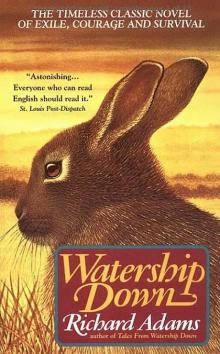 Watership Down
Watership Down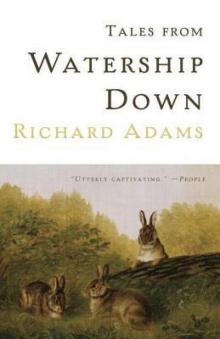 Tales From Watership Down
Tales From Watership Down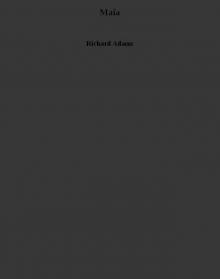 Maia
Maia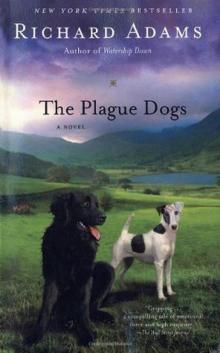 The Plague Dogs
The Plague Dogs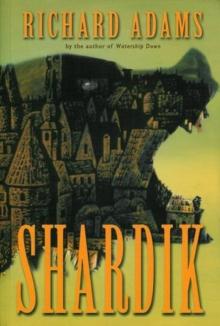 Shardik
Shardik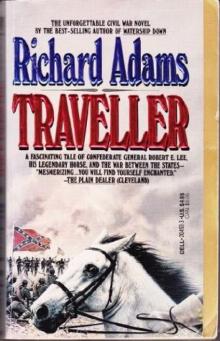 Traveller
Traveller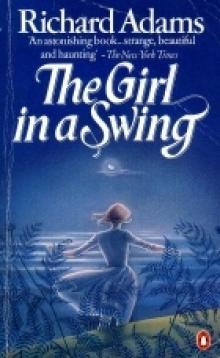 The Girl in a Swing
The Girl in a Swing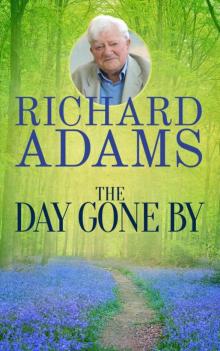 The Day Gone By
The Day Gone By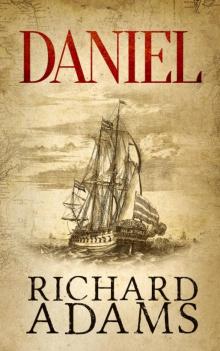 Daniel
Daniel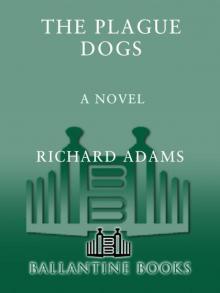 The Plague Dogs: A Novel
The Plague Dogs: A Novel